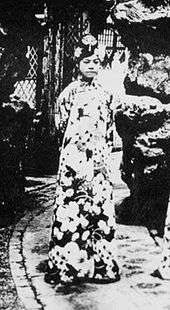Wenxiu
Wenxiu (20 December 1909 – 17 September 1953), also known as Noble Consort Shu (hanzi: 淑妃), was a consort of Puyi, The Last Emperor of China and final ruler of the Qing dynasty. She was from the Mongol Erdet (額爾德特) Clan and her family was under the Bordered Yellow Banner of the Eight Banners.
| Wenxiu | |||||
|---|---|---|---|---|---|
| Noble Consort Shu (淑妃) | |||||
 Photograph of Wenxiu | |||||
| Born | 20 December 1909 Qing Dynasty | ||||
| Died | 17 September 1953 (aged 43) Beijing, China | ||||
| Burial | 1953 | ||||
| Spouse | Liu Zhendong ( m. 1947–1953) | ||||
| |||||
| House | Erdet (by birth) Aisin Gioro (by marriage) | ||||
| Father | Erdet Duangong | ||||
| Wenxiu | |||||||
|---|---|---|---|---|---|---|---|
| Traditional Chinese | 文繡 | ||||||
| Simplified Chinese | 文绣 | ||||||
| |||||||
| Lady Erdet, Consort Shu | |||||||
| Traditional Chinese | 淑妃額爾德特氏 | ||||||
| Simplified Chinese | 淑妃额尔德特氏 | ||||||
| |||||||
Biography
Marriage
Wenxiu was among the candidates listed as suitable by the Qing court as Empress consort. They were not paraded before the emperor as had previously been the tradition; instead, they had their photographs taken and presented to Puyi, who was encouraged to choose his empress from among them. Puyi himself claims that he in fact chose Wenxiu as his empress rather than Wanrong.[1] However, his choice was not approved of because of a conflict among his predecessor's widows, who had different favorites among the candidates. When the time came for Puyi to marry, Consort Jin (Lady Tatara) and Dowager Consort Jingyi (敬懿太妃) had an argument over who should be the empress (the emperor's primary spouse). Lady Tatara favoured Wanrong, while Jinyi preferred Wenxiu. In Lady Tatara's opinion, Wenxiu was not beautiful enough to be empress and she came from a lesser family background as compared to Wanrong. Despite this, Puyi's first choice was Wenxiu, and this frustrated Lady Tatara. She held a discussion with other nobles and officials in the imperial court, and they succeeded in persuading Puyi to select Wanrong as his empress and name Wenxiu as a consort.[1] Wenxiu was taken to the court before Wanrong and welcomed her when she arrived in 1922.
Empress
Along with Puyi and Empress Wanrong, Wenxiu left the Forbidden City in 1924, and moved to the Zhang Garden (张园) in the Japanese Concession of Tianjin. According to Puyi, Wenxiu and Wanrong were during this period both obsessed with luxury and material possessions, specified by the fact that as soon one of his consorts was given a gift, the other one demanded to be given the same.[1] Wenxiu was, however, in the end more dissatisfied with her life than Wanrong, and status was less important to her.[1] She filed for and was granted a divorce in 1931. According to Puyi, Wenxiu demonstrated great courage and willpower during the proceedings, as her wish was greatly disapproved of.[1] Following the divorce, Puyi, urged by former Qing officials, stripped Wenxiu of her imperial titles. According to Puyi, she worked as a school teacher for some years after the divorce.[1]
Later life
Wenxiu married Major Liu Zhendong in 1947 at the well-known Dongxing Pavilion (东兴楼) in Beiping (present day Beijing). Liu later ran a car rental business, which soon went into bankruptcy. Later their landlord fled following the surrender of Beiping in 1948 (which was renamed "Beijing" in 1949 at the end the Chinese Civil War). After the war, Liu confessed to the government regarding their historical issue and found a job in a cleaning services company. They lived in poverty in a 10 square-meter house.
Wenxiu died with only her husband by her side in their house at 10 p.m. on September 17, 1953. Later, with the help of her husband and his group of cleaning service colleagues, she was buried outside the Andingmen.
In 2004, the descendants of the imperial house of the Qing Dynasty granted posthumous titles to Puyi, his two spouses and two consorts. However Wenxiu did not receive a posthumous title because she is considered to have been reduced to the status of a commoner after she divorced Puyi.
See also
- Ranks of Imperial Consorts in China#Qing
- Qing Dynasty nobility
- The Last Concubine, a 2003 TV series
Notes
- Puyi (Swedish): Jag var kejsare av Kina (I was the emperor of China) (1988)